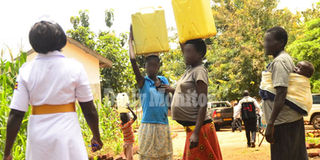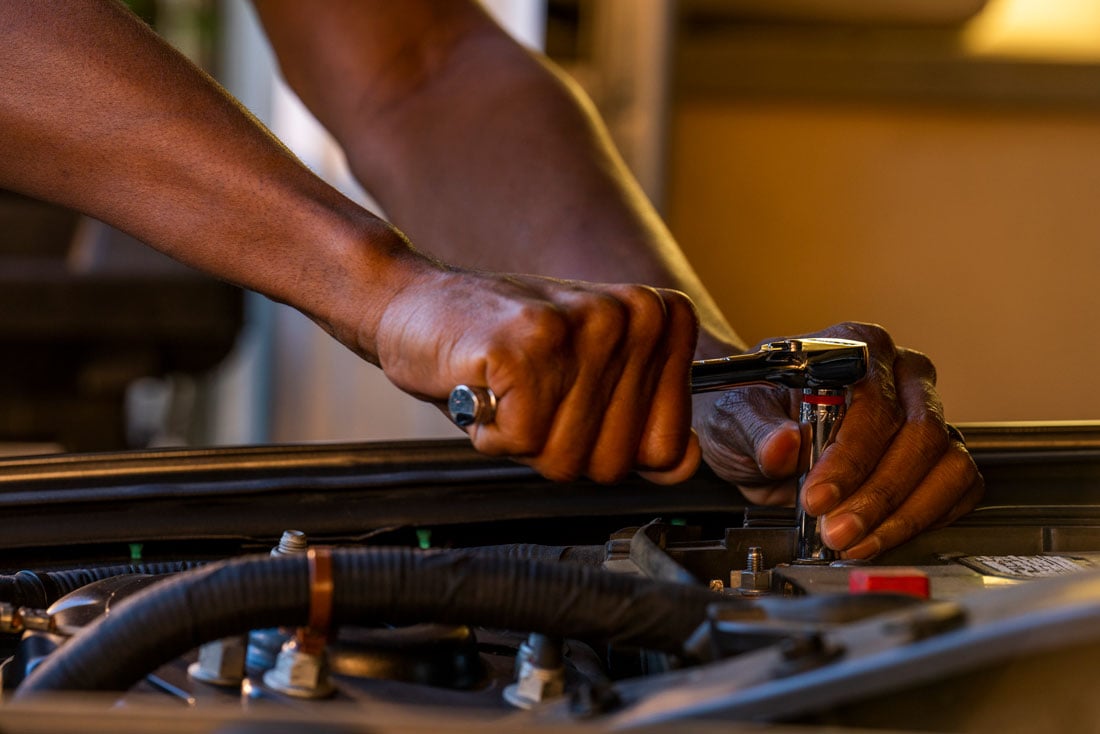Students’ mental health at stake during closure

Pregnant teenagers carrying jerrycans in Palabek Ogili Village. Children suffered challenges such as sexual abuse during school closure. PHOTO/FILE.
What you need to know:
- Following a prolonged period of school closure owing to the Covid-19 pandemic, children and their parents are equally traumatised, requiring psychosocial support.
In March 2020, Uganda joined the rest of the world to take preventive measures to curb the spread of the coronavirus. All schools and higher institutions of learning were locked down and students sent home to the ‘safety’ of their homes.
By April 2020, schools in 188 countries had suspended classes, with over 90 percent of enrolled learners (1·5 billion young people) worldwide out of education according to UNESCO.
Unfortunately, no one was ready for this “unparalleled educational disruption”, which has and continues to socially and psychologically impact greatly on schools, teachers, parents and learners.
In September, a glimmer of hope was given when candidate and finalist students were allowed by the government to resume school, while international schools were given a greenlight to have all students back in school.
Though this was good news to many stakeholders, conversations with a number of teachers, school heads and learners, among others, reveal that apart from financial challenges, psychosocial challenges are a real threat to learners .
“Apart from the students who have totally dropped out because of financial challenges or got married or those that got pregnant during the school lockdown, there is a section of students whom we have received back in school but are going through a hard time,” Gerald, a school head who prefers anonymity shares.
He explains that some of these learners have been sexually abused or exposed to sex, drugs, domestic violence, money and different kinds of behaviour. “Some are simply demotivated concerning education and all they see is doom and gloom because they don’t see the point of learning yet the world seems to be ending soon, with everyone dying,” he adds.
These, he got to know from random conversations he had with teachers and students in the previous term.
A parent’s experience
Attesting to this is Matilda Wanyana, a mother of three. “When it became clear that schools were not opening anytime soon, I got employment for my daughter who was in Senior Four, so that she doesn’t just sit home.
However, when the government mentioned that candidates would be going back to school, I told her she needed to leave the job but she was not willing. I actually had to talk to her boss to fire her so that she could get to school,” Wanyana shares.
She also notes that she is aware that her daughter’s heart and mind are no longer on school or completing her studies but working, something that manifested throughout the previous term.
“I now blame myself that I allowed her to be exposed to work and money,” she says sadly.
Sheba Asiimwe, a parent and organiser of Teenagers Doing Great Things (TDGT) a mentorship group of teenagers from different schools also shares that having a whole year out of school was scary to students and made some give up on school.
“In addition, Covid was also scary to them. Some have lost their parents and relatives to the pandemic and so their heads cannot just go straight to books. Their emotional health needs to be paid attention to. For example, I know a student who has got into using alcohol because her parents separated during the pandemic,” she says.
Asiimwe further notes that having parents that are stressed because they are home, or have lost their jobs and businesses, has put children under the same stress. “Some parents have also been drinking and negatively coping with the pressures that the pandemic has brought, and so have the children,” Asiimwe says.
When asked the role parents have to play in all this, Asiimwe confided that parents also need help. She added that many Ugandan parents have always seen school as the safest place for their children, and many don’t know how to deal with their children or know how to create time for them.
“I know for sure that many parents are excited about the prospect of schools opening so that they can have their space back. During this time, I have got many questions from parents about how they are supposed to communicate with their teenagers or how to deal with them and many have had challenges with that. So, I can tell you that both children and parents need counselling, though we also have to work with the schools to get the necessary help,” Asiimwe concludes.
Research
To further confirm the observations, a study published in August 2020 on the ‘Impact of Covid19 and lockdown on mental health of children and adolescents published by The National Center for Biotechnology Information (NCBI) noted that the closure of schools and colleges which has affected about 91 percent of the world’s student population, has negative mental implications.
“The home confinement of children and adolescents is associated with uncertainty and anxiety which is attributable to disruption in their education, physical activities and opportunities for socialisation. ...children have become more clingy, attention seeking and more dependent on their parents due to the long term shift in their routine.
Adolescents and youth, on the other hand, are anxious regarding cancellation of examinations, exchange programmes and academic events,” the study partly reads.
Professional observation
Albert Luis Elwa is an internationally certified addiction professional, recovery coach and one of the directors of Recovery Uganda. When asked to share his observation, since he works with schools and education institutions to offer psychotherapy, can’t agree more that this is what is happening.
He shared that he and his team had just completed some counselling sessions with a primary and secondary school in Kampala and the findings were; there are profound challenges with students which include; substance abuse, exposure to sex, depression and intensive anxiety especially about the impending national examinations and from disruption of their school routine.
“We talked to these students about how to deal with anxiety, depression and how to deal with the challenges at home. What we did was to have general counselling sessions. In these, we could identify students that needed further help, and we would then give them individual counselling,” he explains.
Elwa adds that based on the challenges, teachers, parents and schools need to embrace psychotherapy, otherwise, it is reckless to think that the children are fine because they are back in class and look healthy.
He further advises schools that have counsellors, to do an in-house audit of the mental health of their students and when individual cases are identified, help can be sought for those students.
“It may also be hard for individual therapy, so they can start with general sessions of therapy/counselling for all learners and then, further help can be given to individuals that have been identified to have more challenges,” he advises.
On top of this, teachers can be trained to identify challenges their learners have and to administer brief/ first aid interventions and then seek for further help, Elwa adds.
He echoes the concern that parents also need help. “From our interactions with students, we learned that the biggest stress comes from home. Actually, some of those students asked us to talk to their parents, and we did. More particularly for parents, it is important that they don’t spiritualise these psycho-social challenges or just wish them away. These are challenges that need therapy and seeking for it is the answer,” he explains.




